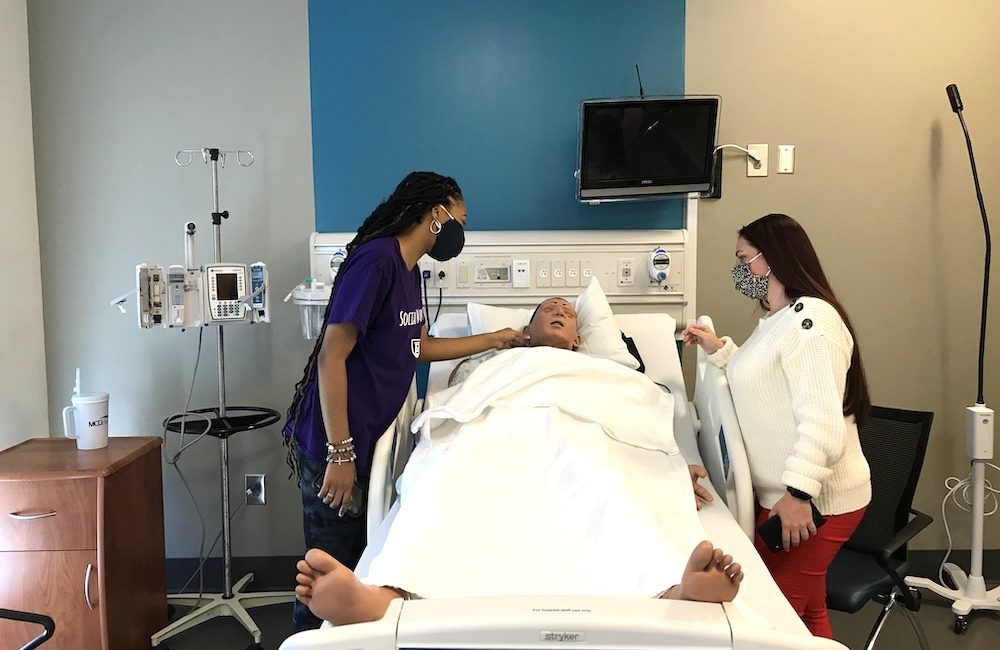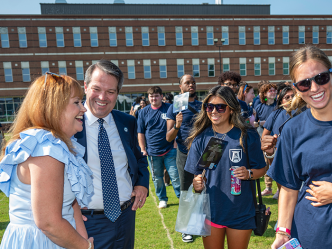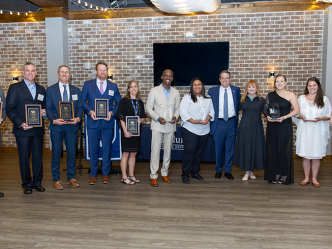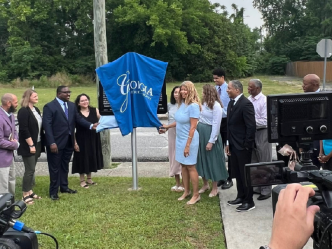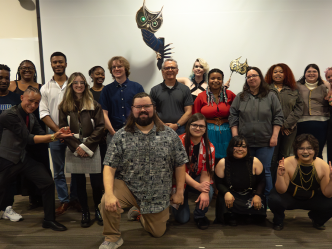When senior Beth Caldwell, 25, learned her social work class would be utilizing Augusta University’s Interdisciplinary Simulation Center this semester to help the students hone interpersonal skills with potential future clients, she didn’t know what to expect.
Social work is all about working with people, so Caldwell wasn’t sure a simulation center would provide her the tools she needed in the real world.
However, Caldwell was pleasantly surprised about how real the simulations actually felt.
“This was a new experience, but it was really beneficial because we would go into the simulation lab and be given a case scenario with another student who would role-play as a client,” Caldwell said. “And we would have to practice our interview skills and talk to this client in order to learn how to de-escalate conflict.”
These socially distanced simulations were conducted this semester with the Augusta University Bachelor of Social Work program to help provide students with the necessary in-person training, which has been a challenge during the COVID-19 pandemic.
“Utilizing the simulation center was really as a response to COVID because securing field placements or internships has been tremendously difficult,” said Dr. Jessica Ziembroski, an assistant professor in the Department of Social Sciences at Augusta University. “This past spring, all of our students were essentially sent home and not allowed to return to the site and had to do remote work.”
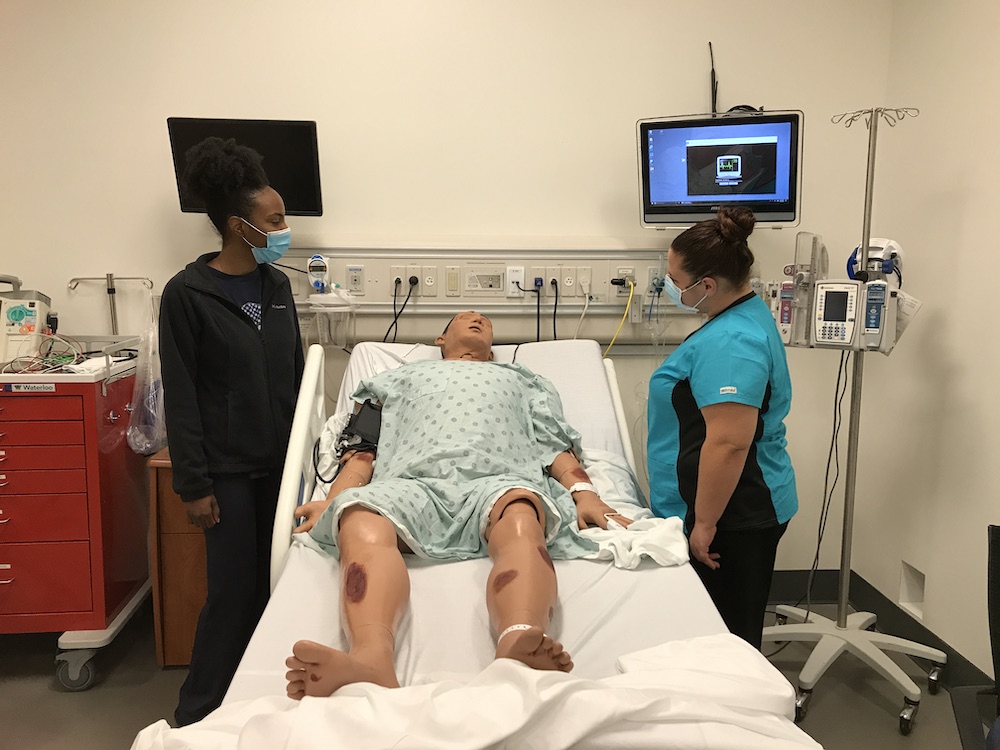
At the beginning of the fall semester, many of the department’s previous internship partners, such as local organizations that assist the elderly or small children, weren’t able to accept student interns because of COVID-19 concerns.
“So, trying to find somewhere to place these students with the kind of work that they need to do to meet our accreditation standards was tremendously hard,” Ziembroski said, adding that Augusta University Senior Lecturer Penny Alderman led the charge to find internships for as many of the social work students as possible. “But we also had to make sure the students were going to get their required hours by our accrediting body.
“Students have to get 170 hours this semester, so the simulation center was a mechanism of ensuring that they could get those hours, but also learn the necessary skills they need to be successful.”
Some of the scenarios that the social work students were given in the simulation center were extremely challenging, Caldwell said.
“There was one scenario where we had a practice in silence,” Caldwell said. “In the scenario, our client would say, ‘I don’t know,’ or just sit there and not respond and it was hard. The client would just shut down and not say anything at all. It was really awkward, but it’s something that will definitely happen in the real world that we need to be prepared to handle.”
Caldwell said she learned tools in the simulation center that would give such a client the time to process their thoughts, so they would feel more comfortable discussing issues they might be facing.
“We talked about asking probing questions that would help our client talk about what they were dealing with,” she said. “And we learned that you have to focus on body language and facial expressions when you’re sitting there in silence and you have to allow the silence to happen for a little while. It is important to let the client pace the conversation.
“That scenario was a real eye-opener, for me. I realized there are going to be times with clients that will be uncomfortable, but I need to know how to handle those situations.”
One of the most helpful aspects of the simulation center was it was providing students instant feedback on their interactions with potential clients, Caldwell said.
“Our professors were watching the case scenario, so if we got stuck or stumbled and weren’t sure what to say next, they were able to help guide us and say, ‘You might want to try this,’ or ‘Ask them this question,’” Caldwell said. “So, working through scenarios in the simulation center was a great learning experience.”
By utilizing the simulation center, Ziembroski said students were able to work through a variety of scenarios throughout the semester and reflect on their performance later by watching a recording. During the session, students observed and evaluated each other in real-time from another room.
“One scenario was a high school student, a boy, was talking about suicide and had written a note,” Ziembroski said. “The students were role-playing what it would be like to deal with that situation as a school social worker. Another scenario was, they were working as a school social worker in a domestic violence shelter and they were dealing with a woman who just came to the shelter who, unfortunately, was badly injured by her husband in front of her children.”
The idea is to allow the students to work with someone in crisis and develop specific skills to handle various scenarios. Ziembroski said.
Not only are the instructors providing the students advice and feedback, but their fellow students also add to the discussion, she said.
“Their fellow students can watch each scenario from another room and discuss how they are doing and fill out an evaluation,” Ziembroski said. “These sessions are recorded and placed in Box, so the students have a follow-up assignment where they go and watch themselves in the session and provide a critique of themselves. So, they’re getting a critique from the faculty member in real-time, from their fellow students and then they provide a self-critique.”
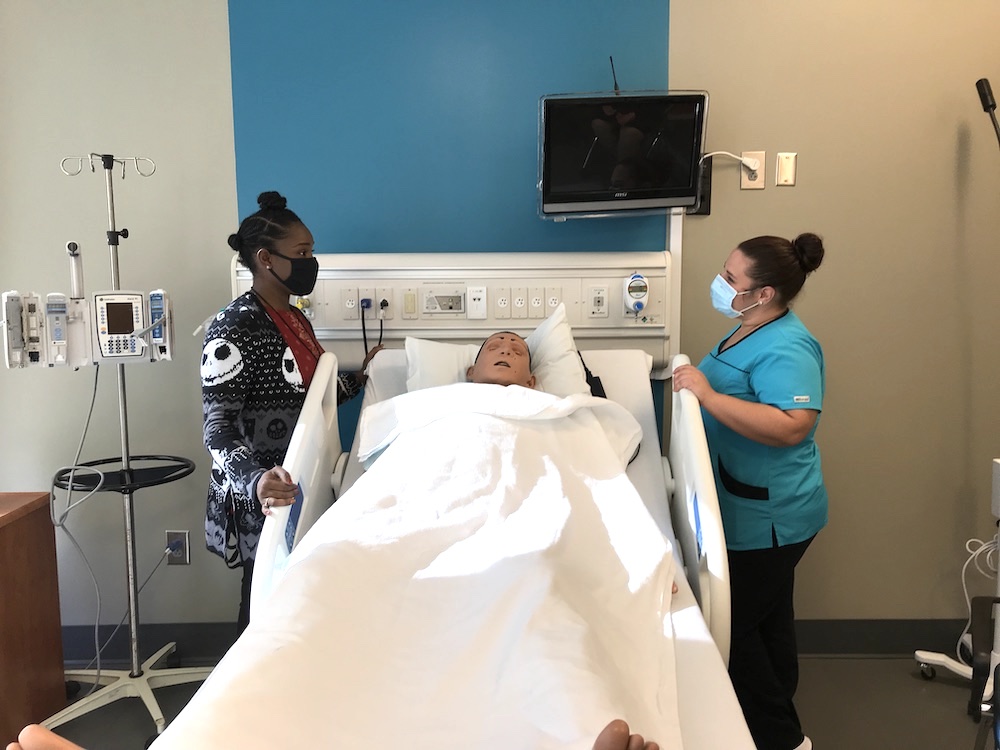
Senior James Aaron Snow said the simulation center’s ability to record each session was invaluable during the training sessions.
“With the tremendous technology in that building, we were able to record the sessions and access them later online and review ourselves and our fellow students, which I thought was really helpful,” Snow said. “You learn a lot by watching yourself and your interactions with a client.”
For instance, Snow recalled one simulation where he was interacting with an elderly person who was expressing a high level of frustration living in an assisted living home.
“Having to work through that conversation and try to do my best to help the elderly person remain calm was challenging,” he said. “You had to calmly talk to him and say, ‘Let’s talk about the good things and let’s focus on what’s going well.’ So, being able to rein it in and see his demeanor change, it just gives you a little more confidence when you’re actually in the field.”
With each simulation, Alderman said the instructors have seen a tremendous improvement in how the students are learning to handle various scenarios they will face as social workers.
“I’ve seen real growth in the people that I’ve watched over the past several weeks,” said Alderman, who worked for almost three decades as a social worker with the Georgia Department of Family and Children Services. “From week to week, the students become better and better in a short amount of time.”
Snow, who had never seen the Augusta University Interdisciplinary Simulation Center prior to this semester, said he was amazed by the facility.
“Having never walked in that building before and just seeing what is a part of our university was very impressive,” he said. “Following the COVID pandemic, I think every student at some point should visit that building. They should see our entire campus and know what we’re a part of. It just increases your pride for Augusta University and being a student here.”
 Augusta University
Augusta University
